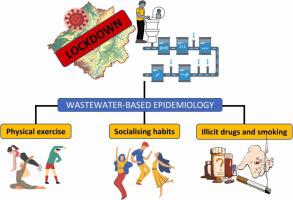当前位置:
X-MOL 学术
›
J. Hazard. Mater.
›
论文详情
Our official English website, www.x-mol.net, welcomes your feedback! (Note: you will need to create a separate account there.)
Assessment of restriction measures implemented during COVID pandemics on community lifestyle choices via wastewater-based epidemiology
Journal of Hazardous Materials ( IF 13.6 ) Pub Date : 2024-04-12 , DOI: 10.1016/j.jhazmat.2024.134264 Nicola Ceolotto , Kishore Jagadeesan , Like Xu , Richard Standerwick , Megan Robertson , Ruth Barden , Julie Barnett , Barbara Kasprzyk-Hordern
Journal of Hazardous Materials ( IF 13.6 ) Pub Date : 2024-04-12 , DOI: 10.1016/j.jhazmat.2024.134264 Nicola Ceolotto , Kishore Jagadeesan , Like Xu , Richard Standerwick , Megan Robertson , Ruth Barden , Julie Barnett , Barbara Kasprzyk-Hordern

|
SARS-CoV-2 pandemic affected lifestyle habits, and the mental health and wellbeing of people around the world. In this manuscript, two towns (Paulton and Radstock) and two cities (Bath and Bristol) in Southwest England (> 1 million people) were monitored for two years using Wastewater-Based Epidemiology to assess impacts of COVID (including management measures such as lockdowns and movement restrictions) on community lifestyle choices: illicit drugs, legal stimulants, abused pharmaceuticals and pain pharma usage. Results were triangulated with key dates captured during the pandemic (national lockdowns, restrictions and social distancing measures, etc.). This highlighted a reduction in cocaine intake (as benzoylecgonine) (community average: −36 %) during the first lockdown and an increase in illicit drugs usage after the 3rd national lockdown (community averages for amphetamine: +8 %, cocaine/benzoylecgonine: +39 %, ketamine:+70 %) when restrictions were removed, and social interaction and recreational activities increased. There was a reduction in the intake of caffeine (as 1,7-dimethylxanthine) (community average:−39 %) after 3rd national lockdown coinciding with pubs reopening while nicotine intake (via cotinine) remained stable indicating lack of impact of COVID on smoking habits. Pain pharma often used in pain management resulting from injuries linked with sport activities (naproxen and diclofenac) showed decrease in usage due to lockdown restrictions in physical exercise and access to gyms/sport facilities.
中文翻译:

通过基于废水的流行病学评估新冠疫情期间对社区生活方式选择实施的限制措施
SARS-CoV-2 大流行影响了世界各地人们的生活习惯以及心理健康和福祉。在这份手稿中,使用基于废水的流行病学对英格兰西南部的两个城镇(保尔顿和拉德斯托克)和两个城市(巴斯和布里斯托尔)(超过 100 万人)进行了两年的监测,以评估新冠肺炎的影响(包括封锁等管理措施)和行动限制)对社区生活方式选择的影响:非法药物、合法兴奋剂、滥用药物和止痛药物的使用。结果与大流行期间捕获的关键日期(国家封锁、限制和社会疏远措施等)进行了三角测量。这凸显了第一次封锁期间可卡因(苯甲酰爱康宁)摄入量的减少(社区平均值:-36%)以及第三次全国封锁后非法药物使用量的增加(安非他明的社区平均值:+8%,可卡因/苯甲酰爱康宁:+当限制取消、社交互动和娱乐活动增加时,比例为 39%,氯胺酮:+70%。第三次全国封锁后,酒吧重新开业,咖啡因(如 1,7-二甲基黄嘌呤)的摄入量有所减少(社区平均值:−39%),而尼古丁摄入量(通过可替宁)保持稳定,表明新冠肺炎对吸烟没有影响习惯。由于体育锻炼和进入健身房/体育设施的封锁限制,常用于治疗与体育活动相关的损伤引起的疼痛的止痛药物(萘普生和双氯芬酸)的使用量有所减少。
更新日期:2024-04-12
中文翻译:

通过基于废水的流行病学评估新冠疫情期间对社区生活方式选择实施的限制措施
SARS-CoV-2 大流行影响了世界各地人们的生活习惯以及心理健康和福祉。在这份手稿中,使用基于废水的流行病学对英格兰西南部的两个城镇(保尔顿和拉德斯托克)和两个城市(巴斯和布里斯托尔)(超过 100 万人)进行了两年的监测,以评估新冠肺炎的影响(包括封锁等管理措施)和行动限制)对社区生活方式选择的影响:非法药物、合法兴奋剂、滥用药物和止痛药物的使用。结果与大流行期间捕获的关键日期(国家封锁、限制和社会疏远措施等)进行了三角测量。这凸显了第一次封锁期间可卡因(苯甲酰爱康宁)摄入量的减少(社区平均值:-36%)以及第三次全国封锁后非法药物使用量的增加(安非他明的社区平均值:+8%,可卡因/苯甲酰爱康宁:+当限制取消、社交互动和娱乐活动增加时,比例为 39%,氯胺酮:+70%。第三次全国封锁后,酒吧重新开业,咖啡因(如 1,7-二甲基黄嘌呤)的摄入量有所减少(社区平均值:−39%),而尼古丁摄入量(通过可替宁)保持稳定,表明新冠肺炎对吸烟没有影响习惯。由于体育锻炼和进入健身房/体育设施的封锁限制,常用于治疗与体育活动相关的损伤引起的疼痛的止痛药物(萘普生和双氯芬酸)的使用量有所减少。



























 京公网安备 11010802027423号
京公网安备 11010802027423号